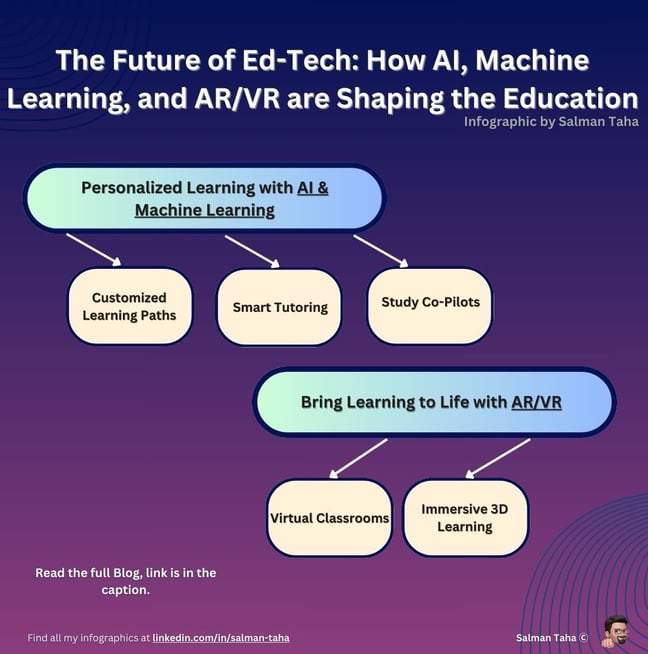The Future of Ed-Tech: How AI, Machine Learning, and AR/VR are Shaping the Education
This article explains how emerging trends are impacting the global educational landscape with unprecedented innovations
ED-TECHTECHNICAL PRODUCT MANAGEMENTB2BB2C
Salman Taha
8/29/20242 min read


Having spent over 12 years in the ed-tech world, I’ve seen how technology can truly transform education. Right now, some of the most exciting changes are being driven by AI (Artificial Intelligence), Machine Learning, and AR/VR (Augmented and Virtual Reality). These tools are making learning more personalized, interactive, and immersive. Here’s a look at how they’re changing the way we learn and teach, and why I’m so fascinated by what’s coming next.
AI and Machine Learning: Personalized Learning Experience
AI and Machine Learning are revolutionizing education by helping tailor learning experiences to each student’s needs. Instead of a one-size-fits-all approach, AI can adjust lessons to fit individual students, allowing everyone to learn at their own pace.
Customized Learning Paths: Imagine a classroom where each student has a learning plan that’s just right for them. AI analyzes how students learn, what they struggle with, and where they excel, and then creates custom lessons. This means students can master topics at their own speed, without feeling rushed or left behind.
Smart Tutoring: AI-powered tutors are a game-changer. These systems offer instant feedback, answer questions, and explain concepts right when students need help. It’s like having a personal tutor (or a co-pilot) available 24/7, perfect for students who like to learn on their own or need a little extra support.
AR/VR: Bringing Learning to Life
While AI is making education more personal, AR and VR are making it more engaging. With devices like the Apple Vision Pro and Meta Quest VR, students can step into virtual worlds that make learning feel like an adventure.
Virtual Classrooms: Imagine studying history by actually walking through ancient cities. With AR/VR, students can do just that. The Apple Vision Pro creates incredibly detailed virtual environments, making it feel like you’re really there. And with Meta Quest VR, students can collaborate and interact with each other in these virtual spaces, making learning more dynamic and fun.
Hands-On Learning: AR and VR also let students get hands-on without ever leaving the classroom. Picture a biology class where students can explore the human body in 3D or a science class where they can conduct virtual experiments. These immersive experiences help make complex ideas easier to understand and remember. With the clear visuals of the Apple Vision Pro and the user-friendly Meta Quest VR, these tools are both powerful and easy to use.
Building the Future of Education
The possibilities for AI, Machine Learning, and AR/VR in education are endless. By using devices like the Apple Vision Pro and Meta Quest VR, we can create learning experiences that are not just effective but also really engaging. The challenge is to integrate these technologies in a way that supports learning without overwhelming students or teachers. By focusing on making these tools simple and intuitive, we can create educational experiences that are both fun and accessible.
Conclusion: A Bright Future Ahead
The future of education is bright, thanks to AI, Machine Learning, and AR/VR. With over a decade in ed-tech, I’m particularly excited about how these new trends will shape the future of learning. These technologies are making education more personal, interactive, and enjoyable. As we explore their potential, we’re not just keeping up with the times—we’re building a better future for learners everywhere.
About the Author
Salman Taha is an experienced Technical Product Management Leader with over 12 years of Software & IT experience. He specializes in SaaS, mobile apps, ERPs, ed-tech, fin-tech, and Agile methodologies. Passionate about bridging technology, design, and business, Salman shares his insights on product management, and leadership through his blog, "TPM & Beyond".
